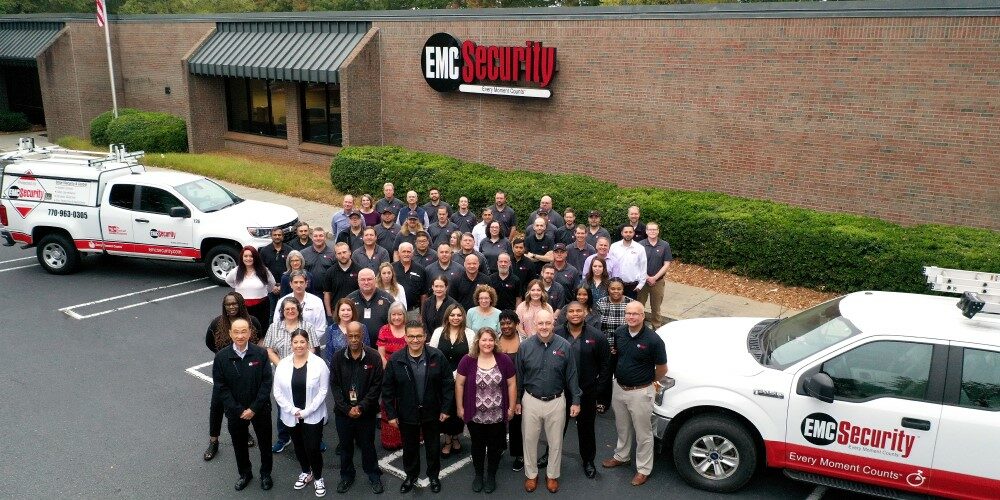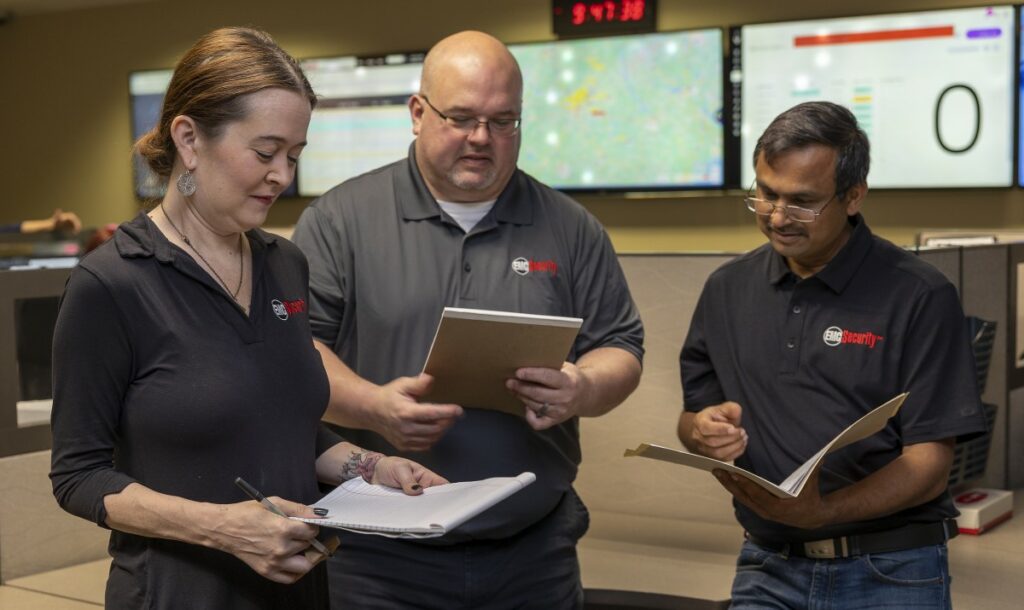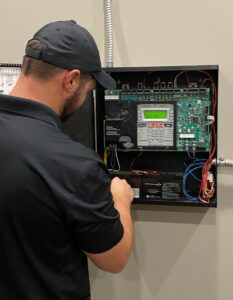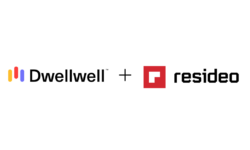EMC Security’s Recipe for Success: No Contracts, DIY, PERS & More
Since 1998, Georgia’s EMC Security has flown high by delivering sterling customer service without the safety net of long-term contracts. Leadership discusses the firm’s unique model, success formula and expansive portfolio.

(All photos by 72 South Productions)
If there is one thing we’ve learned in this age of seemingly unlimited entertainment and shopping options, consumers like to feel like they have a choice in the merchants and service providers to whom they fork over their hard-earned cash — or more apt, electronic payments.
Nowadays it can be a tough row to hoe for an industry like electronic security where companies have traditionally locked customers into term-based contracts. While in recent years some dealers and integrators have moved away from that model, one leading firm has successfully embraced that approach for more than two decades.

“We have always operated with the premise that we would earn our customer’s business every day. Since our first customer in 1998, we have never required our customers commit to a long-term contract for service,” says EMC Security President Vince Raia. “With no contract to ‘hold’ the customer, we have to remain intently focused on every single interaction, be it initial sales, technical support, monitoring response, service response, after hours. All must be as close to flawless as possible, or we risk losing our customer.”
Based in Suwanee, Ga., EMC Security is owned by member-owned electric service providers Jackson EMC, Walton EMC and Grey-Stone Power. Having grown 85% organically from one to more than 60,000 monitored customers, the 125-person company’s projected $30 million in 2022 revenues will be derived from a mix of approximately 63% residential and 37% commercial accounts throughout Georgia. In recent years, EMC Security’s broad portfolio has further expanded into commercial integrated services.
“This year is looking particularly good. Overall revenue is expected to grow 8%, setting a new company record,” says Chief Revenue Officer Michael Morton. “Supply chain has slowed some projects but appears to be getting better. Residential customer growth is slower than historic levels, probably due to the number of new service providers outpacing the growth of new customers. Commercial is expanding as EMC Security continues to be recognized as a quality service provider for commercial midmarket.”
Security Sales & Integration spoke with Raia and Morton to gain more insights into EMC Security’s intriguing operational structure and find out how it has weathered the ups and downs of the marketplace while continuing to evolve. They are joined by Operations Manager John Reeves, Director of Communications Jennifer Kimble, General Manager Gene Musco, Services Support Supervisor Lauren Dean and Controller Chuck Davis. In conversation it becomes clear why so many Georgians choose EMC Security.
Could you elaborate on EMC Security’s somewhat unusual structure?
Vince Raia: Before electricity was really available in some of these areas, investor-owned utilities weren’t in a position to go out to small communities and provide services. With help from the federal government for funding, these EMCs were formed to serve the members in a very unique way. We are built upon that same kind of foundation where we’re all about serving members, taking care of customers as an owner of the business. We are very unique in that manner; it’s created our entire way of doing business.
That’s why we don’t have long-term contracts, for instance. We decided we’re going to have to earn our customers’ business every day. We treat every customer like they’re a member, even though not all of our customers are members of the electric utilities. The EMCs also provide us with a unique way to reach customers as far as being able to contact them when they move or apply for services, and that’s been a real advantage.
Michael Morton: Another unique aspect is when Vince was working with the original founders of the brain trust that put EMC Security together, they wisely decided it was not going to be operated inside the four walls of the owners, they set up a separate company altogether and turned Vince loose on the market to build it as he saw fit. Other cooperatives have added security services, but only to their membership, which is extremely limiting. We didn’t have those limitations when we were formed.

EMC Security’s 125 employees serve 60,000 monitored customers. Above (l-r) is Data Entry Specialist Paula Lindner, Monitoring Specialist Joe Richard and Commercial IT Solutions Specialist Samir Shah.
It would seem advantages that have come along with that are maybe lower acquisition costs, fostering customer loyalty, and those kinds of things. Can you speak to that?
Raia: You hit on a very important part of our success. Some of these companies we partner with or our owners are close to or past 100 years old. They had a long history of service to their customers and members, and we were able to be part of that. They also do provide us with ways to reach potential customers cost effectively.
Jennifer Kimble: They allow us to expand into their territories because we are able to market and advertise through them, which is really nice. They give us opportunities to market to their base, and so it’s really helped us grow and become more well-known in those areas. At the same time, around half our 60,000 active monitored customers are independent of the EMCs.
Gene Musco: One of the key things I’ve discovered is, because we are member owned, we’re directly accountable, which I think has really moved our bar that everybody matters, especially with the no contract. That’s totally different than other companies I’ve been in. We really care.
This structure has also enabled you to be debt-free, correct?
Raia: Yes. That’s something we have worked very diligently since the inception of the company. We knew that growing cost effectively was going to pay dividends down the road. We had a lot of opportunities to acquire other companies or to rapidly expand into other markets regionally and even nationally and we made a conscious decision to grow cost effectively. We made sure we weren’t overstepping the ability for us to serve customers at the highest level possible or have to borrow a lot of money to do so. As we’ve seen, unlimited borrowing capacity doesn’t always lead to a good outcome.
Chuck Davis: Coming from a background of doing startups, EMC Security was a breath of fresh air. Lack of debt also gives us flexibility to do things other companies can’t. For instance, our radio replacement that we just did where we deployed around 27,000 units. With the board’s blessing, we had the cash flow and the capabilities to do that without having to borrow any money or having to charge our customers for doing it. In the absence of debt, when new opportunities show up, we are able to quickly address those situations that are afforded to us.
Although EMC Security’s revenues remain more than 60% residential, why was a decision made in 2018 to expand into integrated commercial services market?
Raia: Yes, but we’ve always also had a small- to medium-sized commercial offer to our customers. About five years in, we had an opportunity to start doing work for apartment complexes, wiring them for low-voltage services, doing security. We weren’t doing a lot of fire at the time, it was mostly internal wiring systems and some of the common area systems, some access control, video. We had great success in that and that quickly grew to be a big part of our business.
We did decide in 2018 to take a real step into the integrated commercial services business because we had opportunities to do very, very large projects that, frankly, I didn’t know we were in a position to do without that expertise. Deciding to get really serious about being in the commercial business, we hired Gene to put together a commercial team that looked nothing like what we had before.
Musco: With my background being in very large global integrators, I saw the opportunity to come to a midsize business and utilize all the good and leave the bad. One of the cultural things I wanted to keep in place is operations and sales being unified instead of always in conflict. By bringing the key project managers, topline engineers and the certified technicians in both NOTIFIER and Avigilon enterprise solutions product lines, we’re able to then serve clients with the right product and the right people at the right time — all the while staying profitable through organic growth without the investment. Back to being debt free, we have grown the business based on the demand and we have kept adding and adding. It’s been going very well.

For commercial jobs, product lines such as Notifier and Avigilon were added or expanded. Shown is Brandon Smith, commercial project manager
Morton: We saw what a lot of other companies our size saw, in that the residential business was tightening with only about 2% growth the past couple years. Meanwhile, commercial business has been doing extremely well coming out of COVID. Of course, in 2018 we didn’t know COVID was going to soon hit. We saw a really tough competitive road ahead in the residential space, with DIYs and other companies entering the market had no history in security. We’ve had pest control companies doing security, HVAC contractors getting into it, electrical contractors in our market entering and, of course, the MSOs were hot and heavy in the business then.
We saw it was overheating a bit and we needed an outlet if we were going to continue to grow. We didn’t think we could do it with our current infrastructure, our current personnel, we needed dedicated people focused on the residential business to stay ahead of our competitors. That’s why Gene was hired, to keep a focus on that commercial business and grow and develop it. He’s done a great job. We’re pleased with where that business is at the moment. Of course, the residential landscape continues to change, and we’ve got eyes on that as well.
How does EMC Security handle service calls efficiently and cost effectively, while still optimizing the customer experience?
John Reeves: We have a full staff of in-house technicians who answer phone calls from customers all day, troubleshooting everything from cameras to key fobs. These guys are all ex-technicians or guys of the trade that allow us to offer that service in-house. With these six to eight guys available at any given time to assist customers, in many cases it helps avoid having to roll trucks.
Raia: Those techs can remote site access the panels. When you look at unique attributes of EMC Security, that’s one of the key things; we’ve always had a team that at no cost to the customer provide that support. In the historic model, they called with a service need, and you sent a truck out and charged the customer an hourly rate. Sometimes it’s a very simple fix and the customer’s unhappy because they paid $100 for a service call, or whatever you charge, to clear an alarm panel trouble condition, or sometimes close a window or door that was opened that they didn’t realize.
We’ve done this for many, many years and it’s paid huge dividends as far as keeping customers happy, reducing attrition. It’s expensive to have six to eight available techs to talk to your 60,000-plus customers, with demand growing because of the technology out there. Smart systems are great and everybody loves them, but they’re all WiFi connected, they’re all interdependent on each other and it drives a lot of service calls.
A lot of companies may not factor that into their metrics as they keep growing that portion of the residential and commercial business. You’re going to have to support it and there’s going to be a cost to that. I don’t know how many companies have the resources we have for our monitored customers.
Reeves: We carry that over after hours as well, with four on-call technicians. I haven’t heard of many other companies that have the same deliverables after hours that we do.
Raia: At no cost to the customer, for the most part, and we do make a lot of service calls too in the field. There’s no doubt we have that capability, but this is that first opportunity for us to take care of a customer quickly, efficiently and at no cost to them, which makes them very happy.
If you enjoyed this article and want to receive more valuable industry content like this, click here to sign up for our FREE digital newsletters!

Security Is Our Business, Too
For professionals who recommend, buy and install all types of electronic security equipment, a free subscription to Commercial Integrator + Security Sales & Integration is like having a consultant on call. You’ll find an ideal balance of technology and business coverage, with installation tips and techniques for products and updates on how to add to your bottom line.
A FREE subscription to the top resource for security and integration industry will prove to be invaluable.








